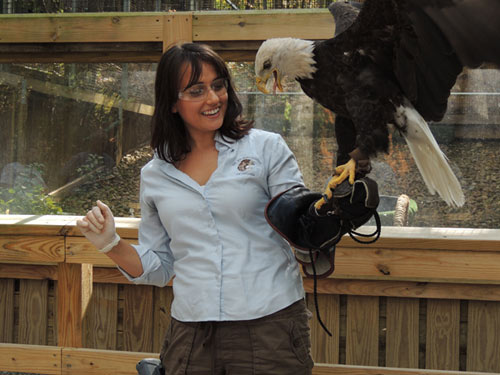This post is part of our Guest Picks series, featuring members of our library community sharing their favorite books and movies.
While working as a naturalist at Cattus Island County Park in Toms River, NJ, Raina realized her passion for teaching people about wildlife. Following that passion, Raina relocated to Virginia in August 2012 to begin her career as an outreach coordinator at the Wildlife Center of Virginia. As outreach coordinator, Raina spends her time teaching people about wildlife by sharing the stories of the patients that pass through the wildlife hospital and the education animals that call the Wildlife Center home.
“Sharing these stories helps people to better understand our connection to wildlife and how our actions have (negative and positive) impacts on the natural world around us.”
When she’s not working, Raina enjoys hiking, trail running, and kayaking (usually with her dogs), caring for her horse, or reading fiction novels or books about wildlife. Raina helps to lead an online, bi-monthly book club through the Wildlife Center– learn more here!
A Chat with Raina
What should people do who find wild animals that need help?
When someone finds a wild animal that they think needs help, they should contact a professional before they do anything. Sometimes when you think a wild animal needs help, you might just be misinterpreting the situation. Mostly everyone has the best of intentions when rescuing a wild animal, but not everyone is fluent in the behaviors of wild animals; that’s why it’s important to ask for guidance.
If you’re bringing a wild animal to a rehabilitator or veterinarian:
1. Call a professional for advice. You can reach the Wildlife Center at 540-942-9453
2. Protect yourself—wear gloves for every animal—even the babies!
3. Protect the animal—don’t cuddle, pet, or talk to the animal. Transport in a quiet car in a crate, box, or container away from people. People are scary to wild animals, and being near them can make a frightened, sick, or hurt wild animal feel much worse and more stressed out.
4. Collect as much information as you can about the situation, like where the animal was found and what made you think the animal needed help.
5. Never offer food or water to a wild animal you’re helping. Many wild animals have sensitive digestive tracts, and feeding them can make them sick or lead to death. Even offering water to some animals can be dangerous for the animal if done improperly.
What should you study in school to become a naturalist or wildlife educator?
You can study lots of different things to become a naturalist or wildlife educator. You can study biology, communications, anthropology—the list goes on and on. There are a few things you’ll need to know and a few skills you’ll need to master no matter what you study in college. You should have a good understanding of wildlife and ecology (so you can properly and accurately explain the natural history of the animals about whom you’re speaking). You also need to be an excellent communicator—knowing how to write and speak well are very important, so you can share your important messages.
I think of myself as a storyteller who happens to know about (and care deeply about) wildlife and the environment. So I put my storytelling skills to use, talking to people about wildlife and sharing some important lessons about human-wildlife interactions.
The library is a great place to start. You can find tons of books about wild animals; it’s a chance to learn more AND figure out how to tell a really great story.
Please tell us about a special animal living at the Wildlife Center now.
Wow, there are so many special animals! But one animal I’m pretty excited about is Oscar the eastern hog-nosed snake. He was previously someone’s pet, and the person could no longer take care of him. Hog-nosed snakes are super cool animals—they have really cool defense mechanisms, and they come in all different colors in the wild. Oscar was named for his acting ability—hog-nosed snakes play dead when they’re afraid. Get it? Like the Oscar awards?
Have you ever considered writing a book about the animals you have helped?
Oh, that would be so cool! I’ll have to think about that. I think I’d write something about opossums . . .
While we’re waiting for her to get that opossum story to us, here are some of Raina’s favorite books, both for grown-ups and kids. Check them out!
Prodigal Summer looks at one small region (presumably not too far from our Blue Ridge Mountains) and guides the reader through the social and ecological connections that can be found there. Also available on audio CD and as an eBook.
Also available as a board book and on audio CD.


